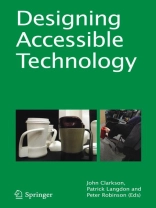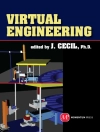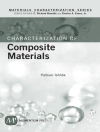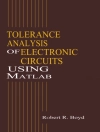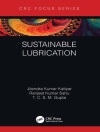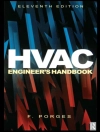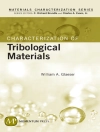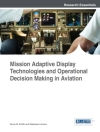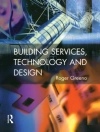Rapid and unprecedented population ageing poses a serious social and economic challenge across the developed world. Shifts in dependency ratios point to escalating welfare and pensions costs which require radical and imaginative responses from Government and industry. Key to this is a healthy population able and willing to work longer before retirement and who can be independent for as long as possible afterwards as well as bringing disabled people into mainstream life and employment.
This book was stimulated by the 3rd CWUAAT workshop (the CWUAAT workshops have a general focus on product and solution development). It was held in Cambridge, UK in April 2006. Contributions from leading researchers focused on:
– design issues for a more inclusive world;
– enabling computer access and the development of new technologies;
– assistive technology and rehabilitation robotics; and,
– understanding users and involving them in design.
Table of Content
Design Issues for a More Inclusive World.- The Inclusive Challenge: A Multidisciplinary Educational Approach.- Universal Design in Japanese Technological Industries.- Encouraging Inclusive Design Through Standardisation.- Factors Involved in Industry’s Response to Inclusive Design.- Providing Strategic User Information for Designers: Methods and Initial Findings.- Design for Inclusion.- Designers’ Use of the Artefact in Human-centred Design.- Enabling Computer Access and the Development of New Technologies.- Introducing COGAIN — Communication by Gaze Interaction.- Older Users’ Requirements for Interactive Television.- Inclusive CAD: A Software Resource for Designers.- Towards an Interactive System Eliciting Narrative Comprehension in Children with Autism: A Longitudinal Study.- Assistive Technology and Rehabilitation Robotics.- Collaborative Visual-servoing of the MANUS Manipulator.- User-centred Approach to the Design and Evaluation of a Stair-climbing Aid.- The SMART Project: A User Led Approach to Developing Applications for Domiciliary Stroke Rehabilitation.- Non-speech Operated Emulation of Keyboard.- Dysarthric Speech Measures for Use in Evidence-based Speech Therapy.- Non-formal Therapy and Learning Potentials Through Human Gesture Synchronised to Robotic Gesture.- Understanding Users and Involving Them in the Design Process.- Inclusive Design Evaluation and the Capability-demand Relationship.- Investigating the Role of Experience in the Use of Consumer Products.- Software Co-design with Older People.- Creating User Centred Creative Design Tools for the Packaging Industry Using Video Ethnographic Research Techniques.- Differing Perspectives on Telecare: An Attitudinal Survey of Older People, Professional Care Workers and Informal Carers.- Away from Home(Public) Toilet Design: Identifying User Wants, Needs and Aspirations.- Involving People with Dementia in the Development of a Discussion Forum: A Community-centred Approach.
About the author
This proceedings of the 3rd CWUAAT conference/workshop is edited by three of the editors who have worked on the previous proceedings. The proceedings from the 1st and 2nd CWUAATs were published with Springer under the titles ‘Universal Access and Assistive Technology’ and ‘Designing a More Inclusive World’. This volume will represent developments in the field from the past 4 years.
